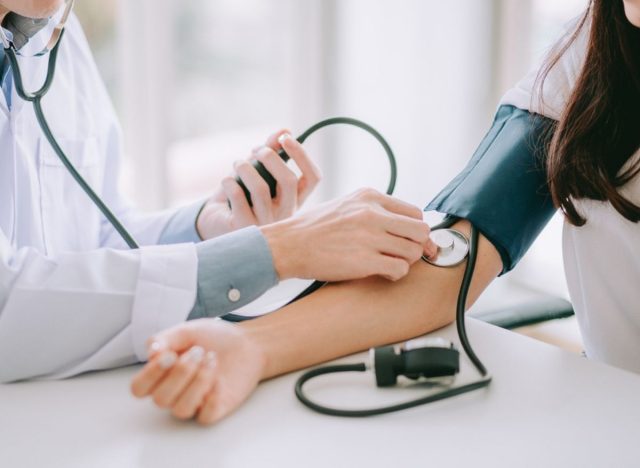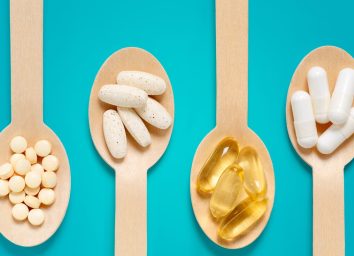The Top Ways To Prevent High Blood Pressure, Expert Says

High blood pressure, also known as hypertension, is a condition many people deal with. In fact, it's not uncommon for someone to have elevated blood pressure for quite some time and not even know it, as it doesn't always come with obvious symptoms. If not taken seriously, hypertension can become very serious, leading to a stroke or a heart attack. According to Mayo Clinic, your chances of developing this condition are greater as you get older, so we reached out to Dr. Mike Bohl, MD, MPH, ALM, a member of the Eat This, Not That! Medical Expert Board regarding the best ways to prevent high blood pressure. Read on to learn more, and next, check out The 6 Best Exercises for Strong and Toned Arms in 2022, Trainer Says.
Understanding your blood pressure

To have a better understanding, your blood pressure consists of two parts: the supply of blood that's pumped by your heart, and how much resistance there is to the blood that's running through your arteries (via Mayo Clinic). The greater amount of blood pumped by your heart and the smaller your arteries are, the greater your blood pressure will be.
The top number of a blood pressure reading calculates the amount of force in your arteries as your heart beats, and the bottom number computes the amount of force in your arteries between each heartbeat. Some of the symptoms that may present themselves if your number is high include shortness of breath, headaches, or nosebleeds. Once again, symptoms don't always appear, and if they do, it can mean your blood pressure is high enough to be life-threatening.
Related: The 5 Ugly Side Effects of Taking Melatonin Before Bed
Eat a healthy diet, perform daily physical activity, and limit your alcohol consumption

Surprisingly, many of the ways to prevent high blood pressure involve the same practices of staying in good physical health. Dr. Bohl recommends eating a healthy diet as a first step. He explains, "This means a diet high in plant foods and low in processed foods," adding, "If you're having trouble figuring out what diet to follow, the DASH diet is specifically designed for those with or at risk of hypertension. DASH stands for 'Dietary Approaches to Stop Hypertension,' and the diet is promoted by the National Heart, Lung, and Blood Institute."
The second step is to get the recommended amount of physical activity on a weekly basis, which Dr. Bohl adds is "at least 30 minutes a day of moderate-intensity exercise at least 5 days a week." Third on the list? Dr. Bohl stresses, "Avoid smoking and limit alcohol—both of these can increase blood pressure."
Related: Why Do I Keep Getting UTIs? New Study Reveals One Shocking Cause
Get a good amount of sleep each night

Another important tip is to be sure you are getting the right amount of sleep every night. The Centers for Disease Control and Prevention (CDC) recommends adults 18 to 60 years of age get 7 or more hours of sleep each night, adults aged 61 to 64 get 7 to 9 hours, and adults aged 65 and over get 7 to 8 hours of sleep. "Blood pressure usually decreases during sleep, and regularly getting too little sleep is associated with high blood pressure," Dr. Bohl says.
Take any prescribed medications as directed by your healthcare provider

Starting new habits to dodge a problem is fantastic. But what if your blood pressure is already at a high level? If you're wondering whether or not you can do some serious damage control to bring your numbers down to normal, the answer is yes. According to Dr. Bohl, you can implement all of the same tips he recommends doing to prevent high blood pressure to be good measures to take control of your blood pressure if it's already high.
Note that it's necessary that you take any prescribed medications as directed by your healthcare provider. There are many blood pressure medications available, and each gets the job done differently. Your doctor will advise which one is the most suitable for you. By adhering to the blood pressure medication prescribed, you can lower your risk of potential long-term effects that come with high blood pressure, such as heart disease.
Avoid caffeine

While you are tweaking your daily habits to maintain good levels, there are a few things you can avoid that can contribute to high blood pressure. Unfortunately, caffeine is one of them, so it's a good idea to limit your intake of caffeinated beverages. The safe amount for each individual varies, but up to around four cups of coffee (or 400mg each day) is typically within a safe level for adults, Dr. Bohl says.








